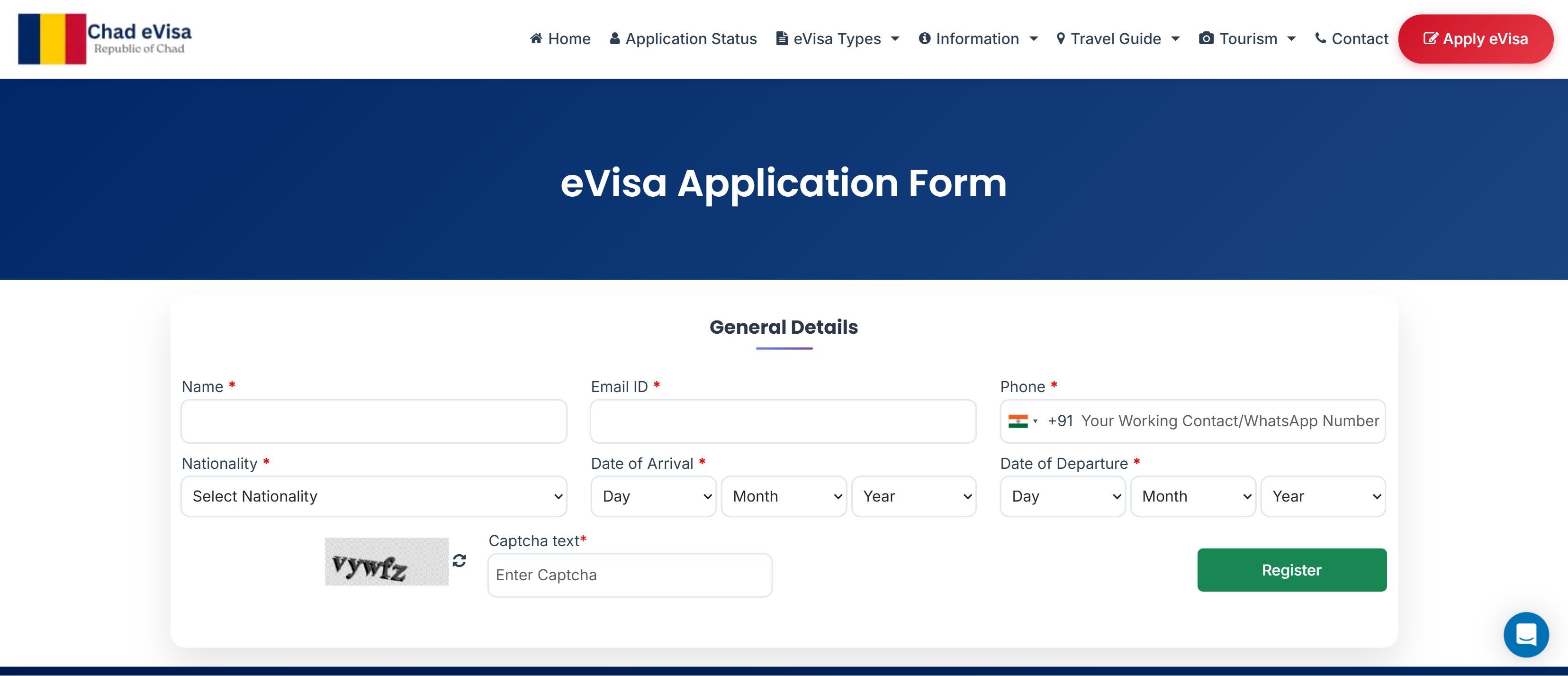Chad, a vast and diverse nation in the heart of the Sahel, has long been a destination for the truly adventurous. From the stunning otherworldly landscapes of the Ennedi Massif to the vibrant wildlife of Zakouma National Park, it offers experiences far off the beaten path. However, for many travelers, the visa process has historically been a significant hurdle.

That's all changed. In a major move to boost tourism and streamline entry, the government of Chad has officially launched its electronic visa (e-Visa) system.
But the big question on everyone's mind is: is it actually working?
This guide will answer that question and every other you might have. We'll walk you through the new system, from who needs an e-Visa to the step-by-step application process, required documents for Chad visa, potential problems, and the best time to plan your trip.
Is the Chad e-Visa System Finally Working?
Yes. This is the most important news. After much anticipation, the Chad online e-Visa system officially launched on December 11, 2024. The online portal is now live and accepting applications from eligible travelers. This new system replaces the old, often cumbersome requirement of visiting a Chadian embassy or consulate in person for most travelers.
Who Needs an e-Visa to Visit Chad?

The simple answer is: most people. Unless you are a citizen of a visa-exempt country (see below), you will need to obtain a visa in advance to enter Chad. The e-Visa is now the standard, preferred method for tourists, business travelers, and those in transit.
Are There Any Visa-Exempt Countries?
Yes, Chad does have visa-exemption agreements with a number of countries. Citizens of the following nations can typically enter Chad without a visa for stays of up to 90 days:
Benin
Burkina Faso
Cameroon
Central African Republic (CAR)
Congo (Republic of)
Equatorial Guinea
Gabon
Niger
Nigeria
Senegal
Côte d'Ivoire (Ivory Coast)
Note: These agreements can change. It is always best to double-check Eligible Countries for Chad eVisa before making travel plans, even if you are from one of these countries.
Chad e-Visa vs. Visa on Arrival: What's the Difference?
This is a common point of confusion. For most tourists, a visa on arrival (VoA) is not a reliable option in Chad. The new e-Visa system is designed to be the primary method for obtaining your travel authorization before you depart.
Do not travel to Chad expecting to get a visa upon landing at N'Djamena International Airport (NDJ) unless you have explicit prior authorization. The e-Visa is the new standard, and it's far safer to have it approved and in hand before you board your flight.
How to Apply for the Chad e-Visa?
The Chad e-Visa has simplified the process into a few manageable steps.

Fill the Online Form: You will need to provide your personal details, passport information, and information about your trip (purpose of visit, dates, address in Chad).
Upload Required Documents: This is the most important part. You will need digital copies (scans or clear photos) of all your supporting documents (see the next section).
Pay the e-Visa Fee: Payment is made online via credit card. The fee consists of the consular (visa) fee and a processing (service) fee.
Track Your Application: After submission, you can use the website to track the status of your application.
Receive Your e-Visa: Once approved, you will receive your e-Visa (an entry permit) by email. You must print this document and present it to immigration officers upon arrival in Chad.
What Documents Do I Need for My Chad e-Visa Application?
Preparation is key. Before you start your online application, gather the following documents in digital format (PDF or JPEG):
Valid Passport: Your passport must be valid for at least six (6) months from your date of entry into Chad. You will need a scan of the main data page.
Passport-Size Photograph: A recent, clear, color photo against a plain background.
Proof of Accommodation: A confirmed hotel reservation for at least the first part of your stay, or a lettre d'hébergement (letter of lodging) if you are staying with someone.
Round-Trip Flight Ticket: A copy of your flight itinerary showing your entry and exit from Chad.
Invitation Letter: This is a key requirement. See the next section for details.
Yellow Fever Vaccination Certificate: Chad is in the yellow fever belt. Your vaccination certificate is a mandatory health requirement.
The "Invitation Letter" for Chad: How Do I Get One?
This document often causes the most confusion. The "invitation letter" requirement can typically be met in one of three ways:
For Tourists: A letter from a registered Chadian tour operator or travel agency. If you book a tour, they will provide this.
For Hotel Stays: A confirmed hotel reservation from a reputable hotel often suffices as your "proof of accommodation and intent," but having a separate letter of invitation from them is stronger.
For Visiting Friends/Family: A Lettre d'Invitation (Invitation Letter) from your host in Chad. This letter must be legalized by a local authority (like a notary or police station) in Chad.
For Business: A formal letter of invitation from the company you are visiting in Chad.
For tourists not using a tour agency, the most common solution is to ask your hotel to provide a formal "invitation" letter along with your booking confirmation.
Are There Common Problems with the Chad e-Visa Application?
Yes, as with any new online system, travelers can face a few "gotchas." Here are the most common problems and how to avoid them:
Payment Failures: The online payment gateway may be sensitive. It may not accept all international credit cards.
Solution: Have a backup card (e.g., a Visa and a Mastercard). If payment fails, try again in a different browser or after clearing your cache.
Document Upload Errors: The system may be strict about file size or format (PDF/JPEG).
Solution: Make sure your document scans are clear, legible, and within the specified size limits before you begin the application.
Incomplete Invitation Letter: A simple hotel booking confirmation may be rejected.
Solution: Ensure your letter of invitation is signed, dated, and, if from a private host, officially legalized.
How Much Does the Chad e-Visa Cost?
The cost of the e-Visa is not a single flat rate. It varies based on your nationality, the type of visa (e.g., tourist, business), and the duration of stay. The total fee is broken down into a consular fee and a service fee.
Be aware that all fees paid for the e-Visa application are non-refundable, even if your application is rejected.
What is the Processing Time for the Chad e-Visa?
The official website recommends applying at least seven (7) days before your intended travel date.
While processing can be faster, it's wise to give yourself a buffer. Some visa agencies report a general processing time of 5 to 15 business days. Do not leave your application until the last minute, especially in case you face one of the common problems listed above and need to re-submit.
How Long is the Chad e-Visa Valid For?
The standard electronic visa is typically valid for a stay of up to 90 days from your date of entry. The exact validity and whether it is single-entry or multiple-entry will be specified on the e-Visa itself.
Do I Need a Yellow Fever Vaccination for Chad?
Yes. This is non-negotiable. You will likely be asked to show your International Certificate of Vaccination (the "yellow card") both when boarding your flight and upon arrival in Chad. This is a mandatory health requirement for entry.
What Are the Main Entry Points into Chad?
The e-Visa is designed for entry at Chad's main international checkpoints.
By Air: The primary entry point for all international travelers is N'Djamena International Airport (NDJ).
By Land: The e-Visa is also intended for use at designated, official land border crossings, such as the main crossing with Cameroon (from Kousseri). However, services at land borders can be less predictable. If you plan to enter by land, it is highly recommended to confirm in advance that your chosen border post is equipped to process e-Visas.
Do I Need to Register with the Police After Arriving?
YES. This is a critical step that many travelers miss, which can cause serious problems upon departure.
Historically, all foreign nationals staying in Chad for more than 72 hours must register with the police. It is unclear if the e-Visa system automates this. To be safe, assume it does not.
What to do: Within 72 hours of your arrival, you (or your hotel/tour operator) should go to the Commissariat Central (police headquarters) in N'Djamena to register your presence. You will likely need your passport, your printed e-Visa, and a passport-sized photo.
Why? Failure to register can result in fines or being blocked from leaving the country at the airport. Confirm this procedure with your hotel immediately upon arrival.
What is the Best Time to Travel to Chad?
This is a key part of your "travel time" planning. Chad's climate is extreme, and visiting at the wrong time can make travel impossible.
Best Time (Dry Season): The best time to visit is during the cool, dry season, from November to March. Temperatures are manageable, and wildlife viewing in Zakouma National Park is at its peak as animals gather around waterholes.
Hottest Season: Avoid April and May. This is the end of the dry season, and temperatures in N'Djamena can soar to 45°C (113°F) or higher, making travel grueling.
Worst Time (Wet Season): The rainy season, from June to September, should be avoided for most tourist travel. Many roads, especially in the south, become impassable muddy tracks, and national parks like Zakouma are closed.
What Happens if My Chad e-Visa Application is Rejected?
If your application is rejected, the fees are not refunded. The most common reasons for rejection are incomplete forms or missing/incorrect documents (like a non-legalized invitation letter). Carefully review your application, ensure all your documents are correct and in order, and you can re-apply.
Can I Extend My e-Visa While in Chad?
If you wish to stay longer than your e-Visa permits, you cannot do this online. You must visit the office of the Direction de l'Emigration et de l'Immigration in N'Djamena before your current visa expires to apply for an extension.
Conclusion: A New Era for Travel to Chad
The launch of Chad's e-Visa system is a game-changer. It's a clear signal that the country is opening its doors and making a serious effort to welcome tourists and investors.
By removing the significant barrier of in-person embassy visits, this new system makes planning a trip to this fascinating country more accessible than ever.
